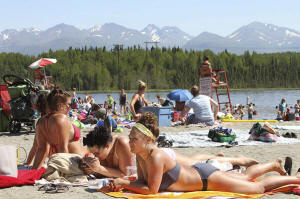The National Weather Service issues Alaska's first ever heat advisory
[June 14, 2025]
By MARK THIESSEN
ANCHORAGE, Alaska (AP) — For the first time ever, parts of Alaska will
be under a heat advisory — but you can put an asterisk at the end of
that term.
It's not the first instance of unusually high temperatures in what many
consider the nation's coldest state, but the National Weather Service
only recently allowed for heat advisories to be issued there.
Information on similarly warm weather conditions previously came in the
form of “special weather statements."
Using the heat advisory label could help people better understand the
weather's severity and potential danger, something a nondescript
“special weather statement” didn't convey.
The first advisory is for Sunday in Fairbanks, where temperatures are
expected to top 85 degrees Fahrenheit (29 degrees Celsius). Fairbanks
has has been warmer in the past, but this is unusual for June, officials
said.
Here’s what to know about Alaska's inaugural heat advisory:
Why it's the first
The National Weather Service's switch from special weather statements to
advisories was meant to change how the public views the information.
“This is an important statement, and the public needs to know that there
will be increasing temperatures, and they could be dangerous because
Alaska is not used to high temperatures like these,” said Alekya
Srinivasan, a Fairbanks-based meteorologist.
“We want to make sure that we have the correct wording and the correct
communication when we’re telling people that it will be really hot this
weekend,” she said.

Not unprecedented and not climate change
The change doesn't reflect unprecedented temperatures, with Fairbanks
having reached 90 degrees twice in 2024, Srinivasan said. It's purely an
administrative change by the weather service.
“It’s not that the heat in the interior that prompted Fairbanks to issue
this is record heat or anything like that. It’s just now there’s a
product to issue,” said Rich Thoman, a climate specialist at the Alaska
Center for Climate Assessment and Policy.

[to top of second column]
|

People sunbathe at Goose Lake in Anchorage, Alaska., June 17, 2013.
(AP Photo/Mark Thiessen, File)

Thoman also clarified that the term swap doesn't have anything to do
with climate change.
“I think some of it is related to the recognition that hot weather
does have an impact on Alaska, and in the interior especially,"
Thoman said.
Little air conditioning
While the temperatures in the forecast wouldn't be considered
extreme in other U.S. states, Thoman noted that most Alaska
buildings don't have air conditioning.
“And just the opposite, most buildings in Alaska are designed to
retain heat for most of the year," he said.
People can open their windows to allow cooler air in during early
morning hours — if wildfires aren’t burning in blaze-prone state.
But if it’s smoky and the windows have to remain shut, buildings can
heat up very rapidly.
“Last year was the third year in a row in Fairbanks with more than a
hundred hours of visibility-reducing smoke, the first time we’ve
ever had three consecutive years over a hundred hours,” he said.
There’s only been two summers in Fairbanks in the 21st century with
no hours of smoke that reduced visibility, a situation he said was
commonplace from the 1950s to the 1970s.
What about Anchorage?
The Juneau and Fairbanks weather service offices have been allowed
to issue heat advisories beginning this summer, but not the office
in the state’s largest city of Anchorage — at least not yet. And,
regardless, temperatures in the area haven't reached the threshold
this year at which a heat advisory would be issued.
Brian Brettschneider, a climate scientist with the weather service,
said by email that the Anchorage office is working on a plan to
issue such advisories in the future.
All contents © copyright 2025 Associated Press. All rights reserved |